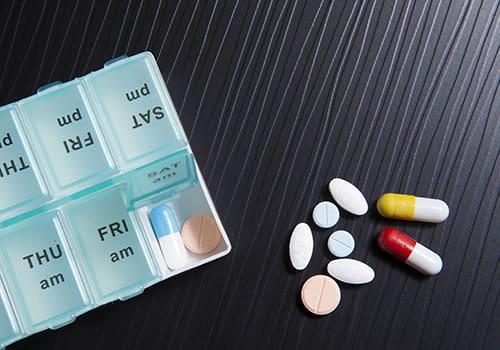
This column originally appeared in the Hingham Journal
Medications help seniors manage age-related conditions as well as other diseases and illnesses. A 2017 study found that 87 percent of adults over age 62 use at least one prescription medication, and 36 percent use five or more. Though medications can improve seniors’ quality of life and keep them healthy and active, having multiple medications to track can easily lead to missed dosages or taking more than what is prescribed.
To ensure medications are taken safely and as directed, seniors and their caregivers need an effective medication management plan. Start by writing down a list of current medications and who prescribed them. On the list, be sure to put the time the medicine should be taken, as well as how often and on what days. Make multiple copies of this list to use when visiting the doctor or pharmacist, and keep a copy in your purse or wallet. It’s wise to save a copy of this list on your computer, smartphone or tablet too so you can easily reference and update it as health needs change. For seniors living with memory loss, it’s best if caregivers take charge of managing and updating this list.
Technology
Technology can be useful for managing a medication schedule, and digital reminders can be especially helpful for seniors with Alzheimer’s or another form of dementia. Medisafe’s Pill & Med Reminder is a free app that lets you set reminders and track which pills you’ve already taken that day. It will even send alerts to caregivers when a dosage is missed. Timer Caps replace standard pill caps and display how much time has passed since the medication was last taken — the time automatically resets every time the bottle is opened.
If you prefer to use pill dispensers or organizers instead of apps and other technologies, consider leaving notes on the containers to indicate what day and time medications should be taken. Rather than sorting pills yourself after a pharmacy visit, look into services like SmartPacks and Pillpack, which sort medications for you and deliver them directly to your door in individual, labeled containers. These services can also be coordinated with your doctor to ensure dosages are updated as needed.
Safety
Taking medications in excess can cause life-threatening conditions, so it’s important to keep medications out of reach from young children or seniors with severe memory loss. Check with your doctor or pharmacist so you know what temperature medications should be stored at, and keep them in a secure, out-of-reach area. Investing in a locking pill box or locking pill bottles may be wise.
Even with a medication management plan in place, you may still miss a dosage, run out of medication or encounter a mishap. Know who to contact when this happens and have a back-up plan in place. Keep an emergency contact list on hand with your doctor’s and pharmacist’s contact information — and since emergencies can happen after hours or on weekends, be sure to have numbers for poison control and your local fire department and emergency medical services team as well.
Medications can be life-saving tools when used correctly, but failing to take them as prescribed can lead to dangerous consequences. By having a medication management plan in place, as well as an appropriate back-up plan, you’ll get the most out of your medications and continue living a healthy and happy life.
Jennifer Trout serves as Executive Director of Bridges by EPOCH at Hingham, a local memory care assisted living community. She can be reached at [email protected].


